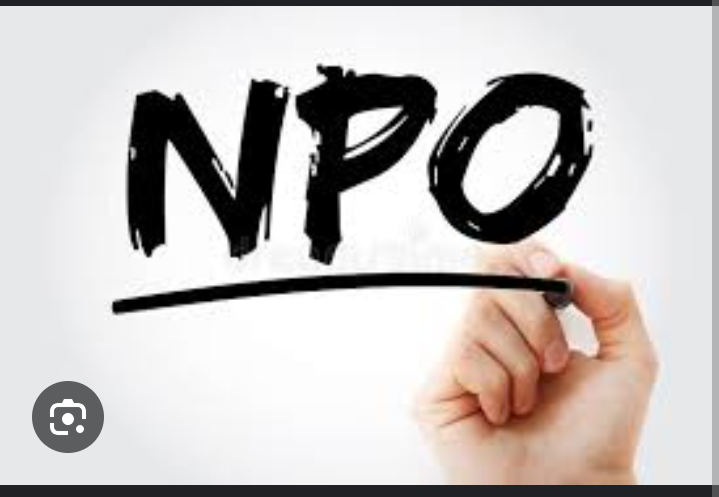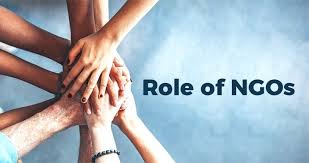
SOCIO-ECONOMIC DEVELOPMENT IN NIGERIA: GOLDEN GENERATION COMMUNITY DEVELOPMENT CLUB AS A CASE STUDY.
1. Introduction
Non Governmental Organizations (NGOs) are set of entities that operate on a common aim and objectives for the purpose of advancing social causes, supporting community interests, and providing public benefits rather than generating profits for owners or shareholders in order to fill the lacunae left opened by the government. Among the NGOs are those that make revenue from stable business they control, hence, they reinvest any surplus revenue back into the organization's mission rather than distributing it as profit. NGOs thus include a wide range of organizations, including charities, foundations, advocacy groups, and social enterprises Talking about the primary aim of NGOs in society, it is basically to address societal and sometimes economic needs that are often unmet by government and private sectors. Most often than not, they focus on issues that center around poverty alleviation, education, healthcare, environmental protection, human rights, and community development. It can be deducibly inferred that NGOs mobilize resources, financial, human, or material resources, to implement programs and initiatives aimed at improving the quality of life for individuals and communities in relation to their aim and objectives. It is important to include that they serve as a voice for marginalized, vulnerable or underrepresented groups, advocating for policy changes and social justice. In this piece, I will be delving into the activities of NGOs in social and economic development in Nigeria taking Golden Generation Community Development Club as a case study. Thus, I will be discussing what NGOs are all about, the importance of NGOs, Golden Generation Community Development Club as a case study, its activities in developing social and economic needs, challenges and then round it off with solution as recommendations.
2. EXPLORING the web of NGOs.
Non Governmental Organizations (NGOs) as the name implies, are non profit making bodies that offer free social services without requesting or aiming for personal gain. They are entities that advocate for social related issues ranging from social activism, human rights advocacy, political empowerment.
Non-Governmental Organizations (NGOs) can be said to have been indispensable actors who aim and work towards complex challenges around the globe. These independent, non-profit and social workers entities, are zealous and eager to fill gaps left by government with their spirit of volunteerism and staunch commitment for social changes. NGOs are locally and globally recognized, it is subject to their mode of operation. However, they are bond together with dedication, volunteerism, non-profit nature and passion for social development. They are attributable with the feature of responding quickly and effectively to crises. Either through provision of emergency relief in disastrous geographical area or advocating for the rights of marginalized communities. Hence, NGOs often fill the void left by slower-moving government bureaucracies. Strong agility and swift adaptability allow them to reach their aim and objectives. They emphatically promote social justice and equality and work tirelessly to combat discrimination, protect human rights, and empower marginalized groups. By raising awareness of important issues and advocating for policy change, NGOs can help to create a more just and equitable world for all. Aside all these, certain categories of NGOs centers on research and production. They conduct research on specific pressing issues, providing valuable insights that can inform policy decisions and public discourse.
Though making significant contributions to addressing global challenges, they also face a number of challenges. These include funding issues, bureaucratic hurdles, and the potential for corruption. These have been the wound that they continue to nurse for a long period of time.
3. NARROWING DOWN TO NIGERIA
Right from the establishment of the Advisory Group on the Development of NGOs in Nigeria around 1993, Nigeria has witnessed and experienced socio-political cum economic transformation based on NGOs' contribution. The provision of Section 40 of the Constitution of Federal Republic of Nigeria 1999 as amended has been a legal backup for the establishment of NGOs. Though facing the problem of economic instability and social pressing issues which have hinder their engagements. The need for NGOs intervention was as a result of Nigerian civil war of 1967 to 1970 which affected the government infrastructural development. Hence, the activities and engagements of NGOs are indispensable.
Mostly, in Nigeria and other parts of the world, NGOs acquire resources from donors, institutions, individuals and other bigger NGOs for financial resources and basically individuals volunteers for human resources. As according to Woodsluke, he opined that “The degree of NGO’s success is directly proportional to the degree of funding success, where government’s policies are favorable, and the cooperation and collaboration constant and consistent.”
In Nigeria, the NGOs have contributed immensely to the social growth through engagement on educational programmes, health sensitizations, and other social initiatives to enhance quality of life. They also contribute to economic development by creating job opportunities, providing vocational training, and supporting small businesses. Though, sometimes, they focus on the marginalized individuals by providing soft non-interest loan and grant and entrepreneurship initiatives that help individuals start their own businesses, thereby stimulating local economies.
Looking beyond the socio-economic agendas, they advocate for policy that will significantly have a positive changes in promoting social justice and equitable development. They indirectly act as watchdogs, holding governments and corporations accountable, and they work to influence public policy in areas such as human rights, environmental protection, and social welfare.
4. Golden Generation Community Development Club (GGCDC): A Case Study
Golden Generation Community Development Club is non-governmental and non-profit organization established in 2016 by Jimoh Lawal Akinlabi who is currently the President together with other like minded individuals who are energetic and passionate to work for social development. It was registered under Corporate Affairs Commission in 2020. Driven by the vices that dominated and continued to eat the fabric of virtues in the society. It is a local oriented organization which are currently restricted to their founding society, Oyo city in Oyo State. It is quite unfortunate when the young ones and growing teenagers are seeing thugs as their role models and live without ambition. The youth who alleged on building careers without ambition, how is that possible? With all these pressing social issues, the organization started to organize trainings, seminars, sensitizations, workshops for the youth and teenagers in order to make them a well rounded persons and be self-reliance. They go by the slogan, "GOLDEN GENERATION" and the chorus is “THE FUTURE IS OUR CONCERN”
Their mission and vision statement is to build the youth and teenagers for humanity. This became their watchword when they realized thuggery has become the order of the day and has been become a career that was lucrative. There are several bases(smoking centres) that could be located in the society which served as the school and junctions were classrooms. The Canival days were war days when blood flows and dead sleep. The most surprising, terrifying but yet saddening is that teenagers were happy to watch the drama and play. Even to the extent of imitating their mode of talking, walking and fighting.
Public secondary schools were not safe, we all agree we have school representatives in quiz and debate competition, Alas! There were also representatives for affray outing. We all know there are laboratories in schools, biology, chemistry, physics lab and computer lab, funnily but dreadfully, there were weapon laboratories in each school..
- B. Objectives of GGCDC
After realizing the vices have rampaging like wildfire in the society, GGCDC came up with the following objectives in attaining their vision and mission statement. The following are the objectives:
-Building youth and teenagers for humanity.
- Brightening the future of the generation.
- Eradicating poverty in society.
- Identifying hidden talents among youth and teenagers.
- To be useful for ourselves , the community, and humanity at large.
5. Activities of GGCDC and Their Impact on Social and Economic Development
The Golden Generation Community Development Club engages in their activities in relation with the identified objectives. The following are their engagements;
A. School Outreach Programme.
Golden Generation Community Development Club took it upon themselves in educating and mentoring youth in schools. The exercise is initiated by raising awareness through their social media handles and letters being submitted to various schools and LIE, if required. They ensure enhancing education and inspiring future leaders through making reference to renowned scholars' in the society.
B. Operation Cash Them Young
After identifying the root of the social vices and how motivated the children are by the thuggery acts, the club thought of the idea catch them young by using school outreach as a grassroot mechanism. Through that, there will be early identification and nurturing of talents. By catching them young, identify hidden talents and provide skill development through vocational trainings.
C. Annual Quiz and Debate Competition:
In the quest of achieving their objectives, they initiated catch them young, in catching the teenagers young, they organize quiz and debate competitions annually. This will encourage academic excellence and will also achieve the goal of catching teenagers young. They award winners with prizes and also provide vocational trainings to eradicate poverty likewise economic self-sufficiency in concomitant with their aim and objectives..
E. Advocacy for Infrastructure Development
In order to fulfill the goal of promoting social infrastructures, which they are not capable of financing, they call the attention of government to infrastructural needs. There was a particular bridge of a major road that was dilapidated and people were unable to pass for their daily activities. GGCDC took to their social media to call the attention of the Oyo State Government to the ruined and disused road.
.F. Orientation Programs for Admission Seekers
Brightening the future of the teenagers is one of the objectives of GGCDC, and education they say is the only weapon that can be used to change the world. In order to attain the bright future and change the world positively, the students who are seeking for admissions every year are guided on several opportunities for their careers. Most importantly, reducing dropout rates and increasing access to education.
6. Challenges Faced by Non Governmental Organizations in Nigeria
A. Funding and Financial Sustainability
One of the obstacles that is hindering the effectiveness of NGOs in Nigeria including GGCDC, is funding and financial sustainability. It is difficult to source for financial resources. The sources of fund for NGOs are unpredictable due to certain factors like economic downturns, changes in options or priorities. These factors leads to shortage or cut of funds. As most NGOs are projects oriented, many donations or grants are provided for specific projects or initiatives. At the end of the projects, the funds cease to flow. This has contributed to unfulfilled aim and objectives of most Non-governmental Organizations..
B. Government Policies and Regulations
Though, the constitution of Nigeria recognizes the formation of Associations in as much as it is not a secret organization. However, there are others multiple regulatory requirements that need to be comply with. Placing burden on local and small organization for financial report to anti money laundering precautions. Moreover, some regulatory requirements can impose operational restrictions which limit the mode of operation of NGOs, even to the extent of dictating where and when to receive grants.
C. Non Justiciability of socio-economic right:
Most of the goals of NGOs are directed the realization of socio-economic rights, however, these rights are not justiciable as governments cannot be compelled or enforced to the execution of these rights, they are just objective principles. See the case decision of the court in the case of Okogie v A.G Lagos State and the clear provisions of s6(6)(c) of the Constitution of Federal Republic of Nigeria 1999 as amended.
6. Recommendations
A. Strengthening Partnerships: One of the easiest ways to maintain effectiveness in both economic and social grounds by the NGOs is to augment partnership with other sectors. Collaborations between NGOs, government and private sectors.
B. Improvement in Funding Mechanisms:
The NGOs should look for special strategies for securing sustainable funding.system. A system that will be reliable, predictable and stable. By ensuring that, the challenge of funding would be solved.
C. Enhancing Public Engagement:
Making of adequate awareness in the community which will in turn foster community involvement. It will relive the burden of la k of human resources and there would be active engagement of the individuals in the society.
. Conclusion
The role of Non-Governmental Organizations (NGOs) in driving social and economic development in Nigeria cannot be overstated. These organizations, operating in various sectors, address critical gaps left by the government and the private sector, often reaching marginalized and underserved communities. The Golden Generation Community Development Club exemplifies how NGOs can foster positive change by focusing on youth and teenagers, nurturing their potential, and contributing to broader societal goals such as poverty eradication, talent discovery, and community development.
Through initiatives like school outreach programs, vocational training, and annual competitions, the Golden Generation Community Development Club not only uplifts individuals but also strengthens the fabric of society. However, the challenges of funding, bureaucracy, and regulatory compliance remain significant hurdles that NGOs must navigate to sustain their impact.
As Nigeria continues to grapple with socio-economic challenges, the contribution of NGOs like the Golden Generation Community Development Club will remain vital. Their work highlights the importance of supporting and enabling these organizations to continue their mission of building a brighter future for all. In conclusion, the growth and success of NGOs are pivotal for achieving sustainable development and improving the quality of life across the nation..
REFERENCES:
Abegunde, A. A. (2009). The role of community based organisations in economic development in Nigeria: The case of Oshogbo, Osun state, Nigeria. International NGO Journal, 4(5), 236-252.
Omorede, C. K. (2014). Organising rural women for socio-economic development and self-reliance in Nigeria: Challenges and prospects. Business and Management Research, 3(2), 47.
Ngeh, D. B. (2013). Non-governmental organizations (NGOS) and rural development in nigeria. Mediterranean Journal of Social Sciences, 4(5), 107-112.
Gebisa, D. A., & Tefera, S. (2019). The Effects of NGOs on Socio-Economic Empowerment of Women: Empirical Evidence from Some NGOs Operating in Ethiopia. Bangladesh Journal of Multidisciplinary Scientific Research, 1(3), 1-9.


